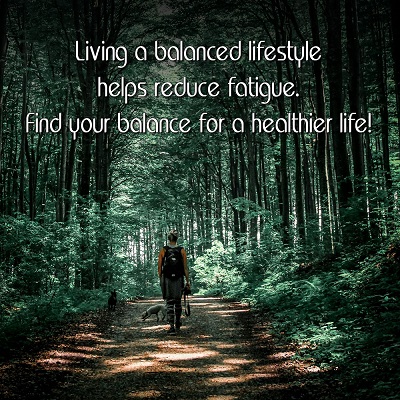 Today, it’s common to feel fatigued by the end of the day. However, it’s important to recognize that your body is not a machine, and it requires care to maintain energy and stamina. How? By embracing a balanced lifestyle.
Today, it’s common to feel fatigued by the end of the day. However, it’s important to recognize that your body is not a machine, and it requires care to maintain energy and stamina. How? By embracing a balanced lifestyle.
One of the first things you have to do is to reduce stress in your life. Stress is a normal part of life, and you can experience both good and bad stress. Good stress is when you are excited about something, whereas bad stress is when you are worried and well, ‘stressy’!
In the short term, stress can provide energy to tackle challenging situations. However, prolonged exposure to stress can deplete your energy and lead to chronic fatigue. Therefore, it’s essential to find ways to manage stress effectively. If you know what helps you, do it.
Here are other strategies to help you cultivate a happier, balanced life, enabling you to feel more in control and less fatigued.
Limit Caffeine, Alcohol, and Harmful Drugs
Excessive consumption of caffeine, alcohol, and harmful drugs can significantly contribute to feelings of tiredness and fatigue. Caffeine is a common stimulant that provides a temporary energy boost, but it’s not long-lasting.
Consuming too much caffeine, particularly later in the day, can disrupt the body’s natural sleep-wake cycle. This disruption can lead to difficulty falling asleep or staying asleep, as well as reduced sleep quality by decreasing deep sleep stages and increasing the likelihood of waking up during the night.
Alcohol, which many people drink to help fall asleep and have it act as a sedative, can also disrupt sleep patterns and contribute to fatigue. Although it may make it easier to fall asleep, alcohol ultimately reduces rapid eye movement (REM) sleep, which is important for restorative rest.
Additionally, alcohol is a diuretic, leading to dehydration, which can exacerbate feelings of fatigue. As the body metabolizes alcohol during sleep, it can lead to fragmented sleep patterns, with you experiencing lighter sleep stages and increased waking disturbances, leaving you feeling unrested and fatigued the next day.
As for harmful drugs, they disrupt the body’s ability to regulate sleep-wake cycles, resulting in sleep disturbances. Dependency or addiction to these substances can further exacerbate sleep issues, leading to insomnia and daytime fatigue.
Optimize Work Environment and Schedule Breaks
Establishing a comfortable and ergonomic work environment can help prevent physical fatigue and discomfort. Adjusting desk height, utilizing supportive chairs, and taking regular breaks to stretch can alleviate muscle strain and enhance productivity.
Ensure you maintain good posture as well. Poor posture may lead to muscle tension, fatigue, and discomfort. Being mindful of your posture throughout the day, particularly during prolonged periods of sitting or standing, can ease muscle strain and decrease fatigue.
Don’t forget to take short breaks to help prevent both mental and physical fatigue. Whether it involves a brisk walk or stretching, integrating regular breaks into your routine can help you feel more energized.
Set Realistic Goals and Practice Time Management
Setting realistic and achievable goals can prevent feelings of frustration and exhaustion. Efficiently managing your time and tasks can prevent feelings of overwhelm and reduce mental fatigue. Breaking tasks into smaller, manageable steps, prioritizing important activities, and utilizing tools such as to-do lists or time-blocking techniques can help you reach goals in a more relaxed, less exhausted manner!
Practice Positive Thinking and Be Grateful
Cultivating a mindset of gratitude and positive thinking can shift your focus away from negative thoughts and energy-draining emotions. Taking time each day to reflect on what you’re grateful for and practicing positive affirmations can improve your life and reduce mental fatigue.
Daily Habits for Life
Let’s not forget that a balanced lifestyle includes eating healthy and exercising, but it also includes the need to maintain and build your social circle. Your relationships with others can help improve your sense of well-being, reduce your stress and anxiety, and increase your motivation and drive. These can have a positive impact on your energy and stamina.
Besides diet, exercise, and your relationships, you need sleep. This is your next important life habit! Nothing can replace sleep. Nothing. When you sleep, it restores the chemicals that are responsible for structuring your circadian rhythm, your sleep-wake cycle. Your energy levels and other bodily functions largely depend on having a healthy sleep cycle as you have seen above.
Having a balanced lifestyle is essential to maintaining high levels of energy and stamina. By following the tips above and incorporating them into your daily routine, you can improve your well-being and life!
If fatigue persists despite lifestyle changes, it’s essential to consult with a healthcare professional. Underlying medical conditions such as sleep disorders, thyroid issues, or vitamin deficiencies can contribute to fatigue and may require medical intervention. So don’t delay!






